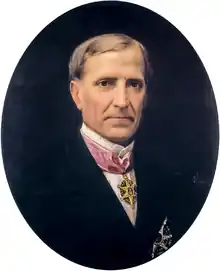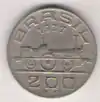Irineu Evangelista de Sousa, Viscount of Mauá
Irineu Evangelista de Sousa (Portuguese pronunciation: [iɾiˈnew ivɐ̃ʒeˈliʃtɐ dʒi ˈsowzɐ]), the Viscount of Mauá ([viʃˈkõdʒi dʒi mɐwˈa], 1813–1889) was a Brazilian entrepreneur, industrialist, banker and politician. Born to a family of small estancieiros (ranchers), Mauá became one of the world's richest men; by 1867, his wealth was larger than the annual budget of the Brazilian Empire. He was called the Rothschild of the South American continent by the New York Times in 1871.[1] He received the titles of baron (1854) and visconde com grandeza (viscount with greatness) (1874) of Mauá. A pioneer in several areas of the economy of Brazil, one of his greatest achievements was to start the construction of the Mauá Railroad, the first railroad in Brazil.
Irineu Evangelista de Sousa | |
|---|---|
 Irineu Evangelista de Sousa, c.1872 | |
| Born | 28 December 1813 |
| Died | 21 October 1889 (aged 76) |
| Occupation | Business magnate; investor |
| Net worth | $60 billion USD (2009 dollars) |
.png.webp)

At his peak, Mauá controlled eight of the country's ten largest companies (the remaining two were state-owned); his banking interests stretched over to Britain, France, the United States and Argentina. Mauá also founded the first bank in Uruguay (Banco Mauá Y Cia).
Mauá, who established the modern Banco do Brasil, is credited with financing much of the Brazilian economy activity in the 19th century, particularly in coffee plantation, and with the construction of the first railroads, shipyard and cast iron metalwork in the country. Mauá commissioned the first telegraphic submarine cable connecting South America to Europe, developed commercial transportation via steamboats on rivers Amazon and Guaíba, and installed the first gas-fueled street lights in the city of Rio de Janeiro, then Brazil's capital. His fortunes turned around with the decay of the Empire after the Paraguayan War, however, and, by the time he died, Mauá had lost most of his wealth.
Legacy and honors
At a time in which Brazil was dominated by government-protected landowners who prioritized exports in a slave-based economy, Mauá defended free enterprise, liberalism, industrialization and the abolition of slavery. After his death, he was given several honors and acknowledgements:
- He is the patron of the Ministry of Transport
- The city of Visconde de Mauá is named after him
- The Baron of Mauá International Bridge links the city of Jaguarão, Rio Grande do Sul with Río Branco, Uruguay
- The day celebrated to the merchant navy in Brazil is on Maua's birthday, December 28th, due to his efforts ahead of the Ponta d'Areia shipyard.
Further reading
- Marchant, Anyda (1965). Viscount Mauá and the empire of Brazil: a biography of Irineu Evangelista de Sousa, 1813–1889. University of California Press.
References
- "SOUTH AMERICA.; The Great Coffee Product of Brazil-- New-York Losing the Trade-- Brazilian Emancipation-- Railway Loans and Amazonian Navigation Contracts-- General News". New York Times. 22 August 1871. Retrieved 2011-10-21.
.svg.png.webp)